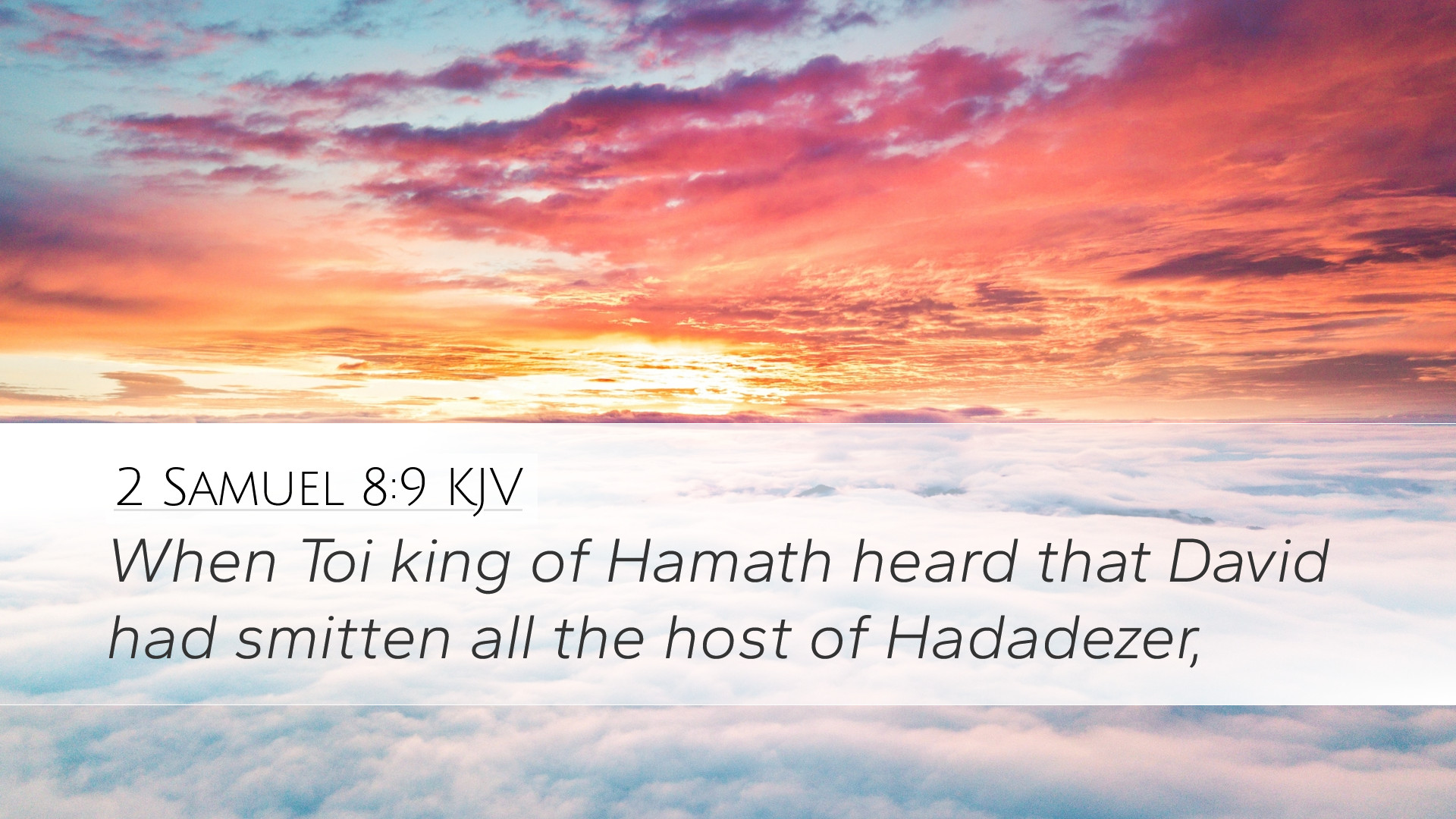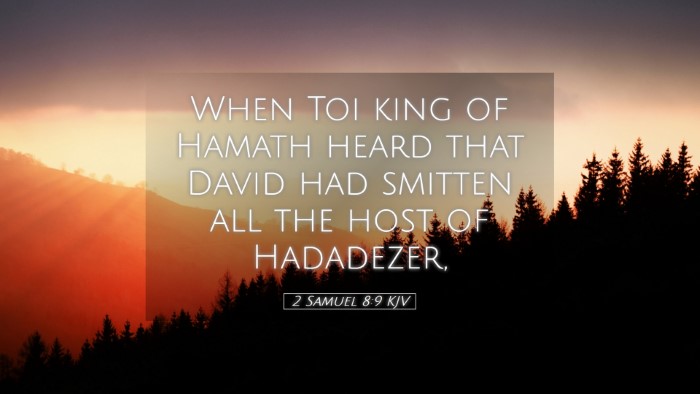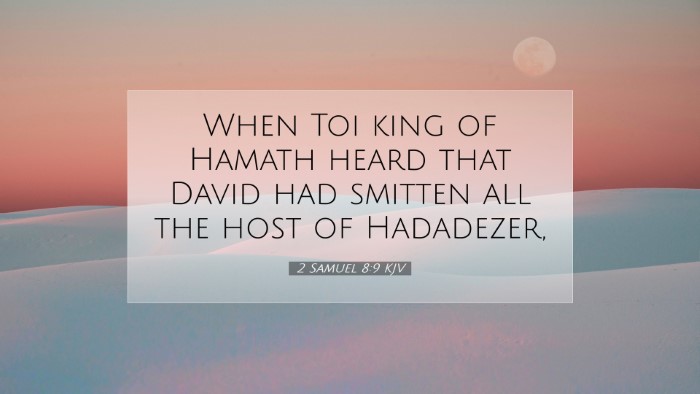Old Testament
Genesis Exodus Leviticus Numbers Deuteronomy Joshua Judges Ruth 1 Samuel 2 Samuel 1 Kings 2 Kings 1 Chronicles 2 Chronicles Ezra Nehemiah Esther Job Psalms Proverbs Ecclesiastes Song of Solomon Isaiah Jeremiah Lamentations Ezekiel Daniel Hosea Joel Amos Obadiah Jonah Micah Nahum Habakkuk Zephaniah Haggai Zechariah Malachi2 Samuel 8:9
2 Samuel 8:9 KJV
When Toi king of Hamath heard that David had smitten all the host of Hadadezer,
2 Samuel 8:9 Bible Commentary
Commentary on 2 Samuel 8:9
2 Samuel 8:9 (NIV) reads: "When Tou king of Hamath heard that David had defeated the entire army of Hadadezer," introduces an important historical context in the reign of King David. This verse signals a significant turning point in David's reign and the geopolitical dynamics during that era.
Contextual Overview
The chapter details David's military victories and his establishment of power in a turbulent period. David's conquests over various nations established him not only as a king but as a formidable warrior. The mention of Tou, king of Hamath, indicates the response of surrounding nations to David's growing influence.
Insights from Matthew Henry
According to Matthew Henry's commentary, this verse highlights the response of neighboring nations to Israel's consolidation of power under David. Henry points out that Tou's message indicates a diplomatic response, suggesting that even enemies recognized David’s strength and sought to align or negotiate with him rather than confront him directly.
- Recognition of God’s Sovereignty: Henry emphasizes that the victories attributed to David are ultimately reflective of God's favor and guidance. The acknowledgement by Tou serves as a reminder of God's hand in the affairs of nations.
- The Nature of Leadership: Henry also notes how David’s character as a leader is evidenced by the diplomatic ties he builds post-victory, showcasing his wisdom in governance.
Reflections from Albert Barnes
Albert Barnes expands on the significance of the phrase “entire army of Hadadezer” in the context of David's military prowess. Barnes underscores that Hadadezer was not merely an enemy but a powerful adversary. David's defeat of such an opponent solidified his reputation in the region.
- Impact of International Relations: Barnes explores the implications of Tou's interest in David’s victories. It signals a potential shift in allegiance and power dynamics among the nations surrounding Israel.
- Relations and Tributes: The subsequent interactions between David and Tou are significant in establishing a network of alliances, which were essential for maintaining peace and security after conquest.
Adam Clarke's Contributions
Adam Clarke approaches the verse with attention to the geopolitical implications of David's conquests. He notes that Hamath was a significant city-state at the time, and Tou's response is indicative of the larger regional fear and respect for David’s military achievements.
- Understanding the Fear of God: Clarke interprets Tou's outreach as recognition of the God of Israel's protection over David, suggesting that the defeat of Hadadezer likely became a significant point of reflection for many nations.
- Strategic Diplomacy: Clarke theorizes that Tou's actions may have been motivated not only by a desire for peace but also by a pragmatic need for alliances given the shifting power balance in the region.
Theological Implications
The theological messages embedded in this passage extend beyond mere historical accounts. This episode reflects profound truths about leadership, divine providence, and the unfolding plans of God for His people.
- God’s Sovereignty over Nations: The events portrayed demonstrate God’s sovereign rule over nations, as He raises leaders like David to fulfill His purposes.
- Leadership Qualities: David's approach to his victories is instructive for modern leadership, emphasizing the importance of humility, diplomacy, and seeking peace over conflict.
Lessons for Today
Drawing from the insights of Henry, Barnes, and Clarke, contemporary readers—be they pastors, students, or theologians—can extract several vital lessons from 2 Samuel 8:9.
- Responsibility of Power: Understanding that with great power comes profound responsibility. David's victories were significant, yet his subsequent actions reflected his duty toward his subjects and neighboring nations.
- Seeking Peace: In a world often driven by conflict, the value of pursuing peace through diplomacy and wise leadership stands out prominently. Emulating David's example may lead to more fruitful relationships within communities and nations.
- Faith in God’s Guidance: As David trusted in God's provision and would later include the care for the Ark of the Covenant, modern believers are reminded to remain faithful, seeking God’s direction even in times of strength and victory.
Conclusion
2 Samuel 8:9 serves not only as a historical account but also as a profound theological reminder of God’s intervention in human affairs. The significance of the interactions between David and his contemporaries, like Tou of Hamath, provides a framework for understanding leadership, international relations, and the overarching sovereignty of God.


